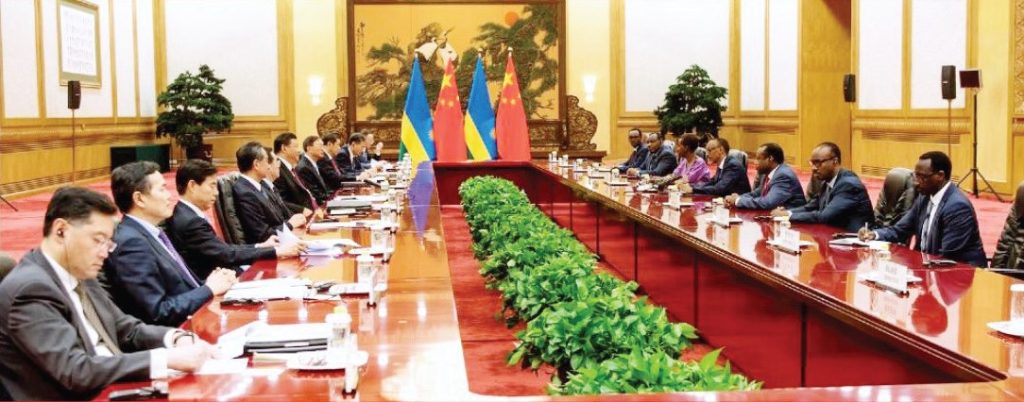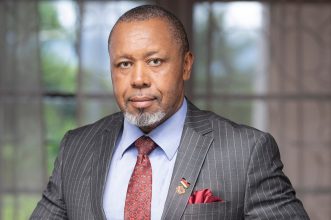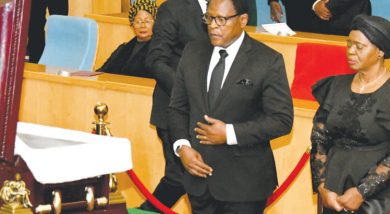Building a global community of shared future
Former Deputy Minister of Foreign Affairs and International Cooperation EPHRAIM ABEL KAYEMBE shares his experience with China-Africa engagement.
Globalisation and interconnectedness have transformed China-Africa relations into a beacon of dynamic cooperation and mutual benefit.

Parties in this win-win partnership contribute to and benefit from their strategic collaboration.
China’s economic and technological advancement is increasingly cementing its allure as a key partner for Africa in various sectors such as infrastructural development, energy, agriculture, transportation, telecommunication, trade, investment and capacity building.
By investing in critical socioeconomic development, China plays a crucial role in developing African economies.
The Asian superpower has significantly contributed to enhancing Africa’s connectivity to the global economy. This strengthens the continent’s economic competitiveness.
Through development vehicles such as the Belt and Road Initiative (BRI) and the Forum on China-Africa Cooperation (Focac), China and African countries have strengthened their diplomatic and economic ties, a lasting friendship considered mutually beneficial.
However, “a global community of shared future globalisation”, as stated by Chinese President Xi Jinping, has challenges.
African countries, including Malawi, need to understand how to harness this bond to build and strengthen their economies.
A shared future
China defines a global community of shared future as a “vision for global governance characterised by cooperation, mutual benefit and common development”.
The concept first raised by President Xi in 2013 hinges on five pillars.
They include developing and strengthening strategic partnerships with countries that treat each other equally before international law; valuing and deepening consultations; enhancing mutual understanding; and creating a secure and sustainable environment in which fairness, justice and joint efforts thrive.
Other pillars include enhancing inclusive and innovative development and increasing inter-civilisation exchanges to promote harmony, inclusiveness and respect for each other despite cultural and ideological differences.
President Xi emphasises building a stronger China- African community that takes joint efforts and responsibilities to implement win-win regional and continental policies that advance inclusive growth and sustainable development for a shared future.
China underscores efforts to build stronger win-win cooperation.
As President Xi said: “We need to see to it that the Belt and Road Initiative and the AU 2063 development agenda are not contradictory but complementing each other.”
According to the Chinese leader, China’s engagement with Africa is based on mutual respect, equality and non-interference in internal affairs.
He has rejected a one-size-fits-all approach and encouraged countries to pursue development issues based on their unique characteristics and developmental underpinnings.
By implication, China wants to engage with different players based on their aspirations and agreed core areas without dictating what they should pursue in the partnership.
Xi often talks about specific areas of cooperation, including infrastructure development, industrialisation, agriculture, healthcare and people-to-people exchanges, while stressing the need for tangible benefits for both sides.
In East Africa, China has constructed a strategic railway that connects Mombasa City to Nairobi and eastern Uganda. The arrangement is to expand this railway to Rwanda, opening up some landlocked countries to sea trade routes.
Zambia and Tanzania are benefiting from the upgrading of Tazara railway.
The rail line connects Zambia to trade routes across the Indian Ocean and Mediterranean Seas.
Xi has often highlighted mutual benefit and common development as the foundation of China-Africa cooperation, stressing that China’s development is closely linked to Africa’s.
He frequently mentions the desire to promote peace, stability and prosperity in Africa.
Xi’s comments express China’s determination to establish a comprehensive strateg i c partnership with Africa based on equality, mutual respect and win-win cooperation.
China policy
China has implemented a range of policies and strategies to demonstrate its commitment to developing a global community of shared future.
For example, China has strongly focussed on capacity building and skills transfer in its engagement with Africa.
Its training programmes, scholarships and technical assistance have helped develop human capital and strengthened i n s t i t u t i o n a l capacity i n agriculture, healthcare, education and global economic governance.
This investment in human resources is essential for sustainable development and poverty reduction in Africa.
Several countries, including Malawi, have trained its agricultural and medical scientists, engineers and political scientists in China by utilising the scholarship opportunities designed by Beijing.
The choice to train African citizens in particular fields is squarely the fundamental choice of Africa without any dictation.
Cultural exchange
China promotes cultural exchanges to enhance mutual understanding and friendship between the people of China and Africa.
This includes cultural festivals, academic exchanges and youth programmes that contribute to building trust and solidarity.
The two sides have developed a common understanding of how certain projects ought to be pursued with respect for engrained work ethic and culture while complementing each other’s development and continuous learning.
Political engagement
China has engaged in political dialogue and diplomatic cooperation wi th Af r ican countries through high-level forums, including the Focac. The meetings provide a platform for discussing issues of mutual interest and coordinating policies and strategies for addressing global challenges.
Thr ough thi s , cr u c i a l development issues have been isolated and prioritised for common development.
How is Africa benefiting?
Infrastructure development
Chinese inves tment in infrastructure projects helps address Africa’s infrastructure deficit, enhance connectivity and facilitate economic growth.
Improved infrastructure enables African countries to attract more investment, stimulate trade, and foster regional integration.
Malawi can take advantage of resources under BRI to develop its railway infrastructure connecting Lilongwe and Mzuzu to Tanzara at either Mbeya or Tunduma.
The Nacala Corridor could be extended to Zambia through improved Liwonde-Salima- Mchinji Railway; thereby connecting Mozambique, Malawi and Zambia to the sea routes. This joint regional development may enhance inter-regional trade and connectivity to stimulate economic growth.
lEconomic diversification
By exporting commodities to China, African countries can generate revenue and invest in vital sectors, reducing their dependence on resource extraction.
China’s growing presence in Africa has opened up new trade and investment opportunities for African businesses. Increased trade with China allows African countries to access a larger market for their goods and services, while Chinese investment provides capital, technology and expertise to support industrialisation and value-added production.
lJobs and skills development
Chinese- funded projects in Africa create employment o p p o r t u n i t i e s f o r l o c a l communities and contribute to skills development through training programmes and technology transfer. This helps to address unemployment and underemployment, particularly among the youth, and build a skilled workforce capable of driving economic growth and innovation.
lRegional cooperation
African countries leverage their partnerships with China to strengthen their diplomatic and political influence on the global stage.
By participating in initiatives such as the BRI and the Global Development Initiative(GDI), African countries can advance their interests, increase their visibility and diversify their diplomatic relationships.
lGreen development
Chinese investment in Africa increasingly includes projects that promote environmental sus tainab i l i ty and green development.
This includes investments in renewable energy, conservation initiatives, and eco-friendly infrastructure projects that minimise environmental impact and support climate resilience.
By embracing sustainable development practices, African countries can safeguard their natural resources and ecosystems for future generations.
Conclusion
China’s engagement with several actors, including African countries, has always been underpinned by the development philosophy of a global community of shared future within the win-win framework.
G l o b a l d e v e l o p m e n t programmes such as BRI, Focac and GDI have emphasised the need to advance a development agenda that pushes for full respect of the equality principle, inclusiveness, mutually beneficial engagements and peaceful development.
Taking advantage of “a global community of shared future”, Africa may benefit more from the China-Africa partnership.
Therefore, African countries should seriously discuss i m p o r t a n t d e v e l o p m e n t issues that could add value to the partnership for win-win development cooperation.
Africa ought to isolate and prioritise its development path but also to learn, relearn and unlearn from other international actors like China to develop its development model based on its unique characteristics.
Regardless, the common pursuit of a global community with a shared future demands treating each other with equality and mutual respect while emphasising regional and continental policy coordination and implementation.
With a global community of shared future, both China and Africa can truly realise win-win development cooperation if they pursue development issues with concerted efforts and collectively resolve challenges emerging in the partnership. n
—The author is a geopolitical scientist with vast experience in International relations and diplomacy. He has researched deeply on the China-Africa partnership, g e o p o l i t i c s o f d e v e l o p m e n t multilateral financial institutions and development aid, peace and security.





